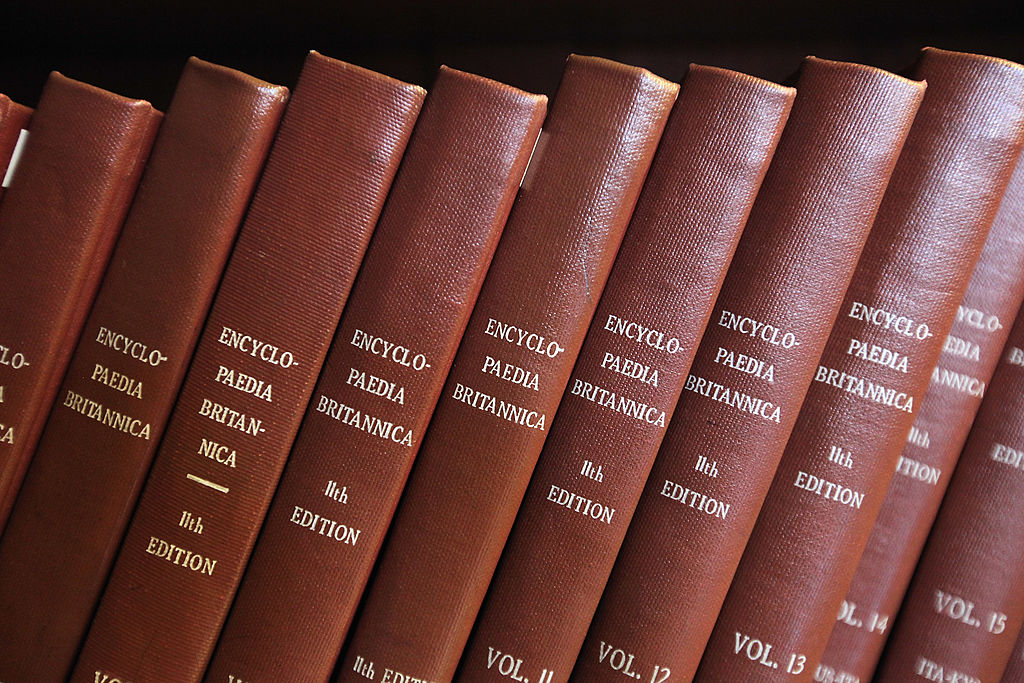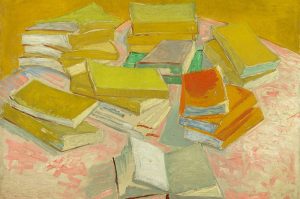Simon Winchester recalls the time — he was not yet three — when, stepping into his rubber boot, he was stung by a wasp.
He rates this penetrating moment as his first “acquisition of knowledge.” Readers of his many books may thank that wasp for starting Winchester on his ever-widening path to further knowledge. His new book, Knowing What We Know: The Transmission of Knowledge, from Ancient Wisdom to Modern Magic (KWWK for short), is what that wasp hath wrought.
It follows close on the heel of Simon Garfield’s entertaining study, All the Knowledge in the World: The Extraordinary History of the Encyclopedia (AKW for short). Despite the title, Garfield’s ambitions are more cabined than Winchester’s. There was no stinging or biting insect that set him going but an eBay offer of supplements to the Encyclopaedia Britannica published from 1815 to 1824. Garfield recognized, however, that such books have limited value. “An old encyclopedia was about as popular as a burst balloon.” Such books tell us what once passed as “knowledge,” but might now be discredited, superseded, or simply quaint.
KWWK and AKW are cousins, but perhaps in the manner of ducks and auks, aquatic birds that are excellent swimmers and clumsy on land, but otherwise distinct. Winchester’s KWWK ranges over the myriad ways we attempt to preserve what we know; Garfield’s AKW dives deep into just one such tool of preservation. Winchester is haunted by fears that knowledge will decay, fall short of wisdom, or be rendered obsolete by machinery that makes it unnecessary “to know much about anything.” Garfield, by contrast, is a sturdy optimist: “A fine encyclopedia will stand you in good stead like an old wristwatch… Ancient editions carry a secret knowledge of their own, the enshrined accretion of learning.”
;768:[300×250,336×280,320×100];0:[300×250,320×100,320×50]”]This is not to dismiss the appeal of Winchester’s great tour. He does indeed know a lot about a lot and shares it in appealing ways. He twice took on that Mount Everest of word books, the Oxford English Dictionary: first in The Professor and the Madman (1998) and again in The Meaning of Everything (2003). He studied terra firma to write The Map That Changed the World, terra less firma to shake out A Crack in the Edge of the World about the great California earthquake of 1906 and summed matters up in Land: How the Hunger for Ownership Shaped the Modern World (2021). And when he loosened his hold on dry soil, he wrote about the Mississippi (The End of the River, 2020) and whole oceans (Atlantic, 2010, Pacific, 2015). Garfield, by contrast, indulges smaller subjects, sometimes literally. His book In Miniature: How Small Things Illuminate the World deals with model railways, dollhouses, matchsticks and tiny food, among other charming quiddities. He has also written books about typefaces, clocks, pro wrestling and the automobile called the Mini.
If I have to choose between these birds, I would go with Garfield’s AKW. It is the more consoling view. We are limited creatures who sometimes aspire to know a lot, but even our greatest savants command just thimblefuls of the known and the knowable. Faced with that, is it not better to be like an auk and dive deep in pursuit of our small prey than to paddle, duck-like, all around the surface?
Winchester and Garfield, however, faced similar challenges in writing books about so amorphous a subject as “knowledge.” We normally leave this to philosophers, and rightly so because we can so easily tumble into the sandpit of definitions. A wasp sting confers a kind of knowledge, but so does a proof of the Pythagorean theorem, and we have a thousand other ways of “knowing” that may or may not be “knowledge” — the smell of a rose, the sound of a sniffle, a familiar face, a half-remembered line of poetry — depending on who controls the turnstile.
Garfield’s genial solution is to organize his book alphabetically, which allows him to dive after whatever morsel of knowledge attracts his eye: for readers it means feeling much as if we were browsing an actual encyclopedia written by a companionable soul. The alphabet-ism is more conceit than constraint. The first entry is “Aah, Here Comes Andrew Bell.” He wins his pride of place as the co-founder (in 1768) of the Encyclopaedia Britannica, and contributor of some 500 engravings to it. Z brings us to Żywiec, a Polish town that is the last word in the last printed edition of the Encyclopaedia Britannica.
Winchester sets himself a more Magellanic cruise. Cuneiform tablets, Andaman Islander folk traditions (head for the high ground when a tsunami comes), trestle table schools in Indian slums, alphabets, law codes, Ashurbanipal’s library at Ninevah, the great Polynesian navigator Mau Piailug, and on to the photograph of Earth rising over a gray moonscape — Winchester does not miss much that could count as “transmission” of knowledge. Nor does he leave out the transmission of false knowledge via propaganda and mass delusion.
;768:[300×250,336×280,320×100];0:[300×250,320×100,320×50]”]Hanging over both books, I suppose, is whether the owl of Minerva is about to take a final crepuscular flight. Do these books serve as grave markers of the venerable tradition of the printed encyclopedia? (Wikipedia is a written-on-water substitute.) Are Winchester and Garfield telling us that the long human quest to actually know the world is over now that we can rely on some machine to know it for us? They don’t exactly say so, but I hear the echo of someone slamming shut a door — or perhaps the cover of a great and heavy book.
This article was originally published in The Spectator’s July 2023 World edition.

























